Music Builds Maker Mindsets: The Power of the Performing Arts
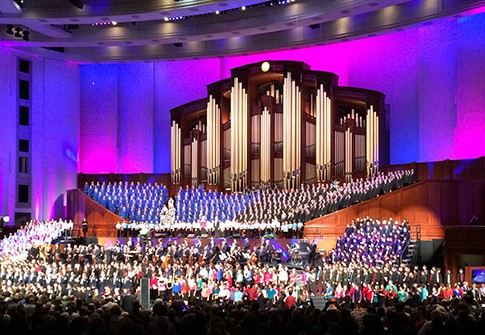
I recently had the privilege of attending the American Choral Directors Association (ACDA) annual conference in Salt Lake City. I was there as the parent of a 2015 ACDA National Honor Choir student, and was reminded, once again, of the power of the performing arts to impact students’ lives far beyond the stage, including their mindsets.
This conference engaged over 5,000 choral directors, 55 performing groups, and 20,000 people who were treated to a culminating concert hosted by Sylvia McNair and Santino Fontana (Hans from Frozen). The concert featured the Mormon Tabernacle Choir, Orchestra at Temple Square, United States Air Force Singing Sergeants, ACDA Honor Choirs, McNair and Fontana. The night ended with this incredible lineup joining together to sing “He’s Got the Whole World in His Hands.”
A theme of the concert, the conference, and this blog, is that educators have the future of our students in their hands – and music is a critical component of it.
Tom Vander Ark, who has personally experienced the rewards of participating in choral groups, asserts that every student ought to have a powerful performing arts experience. Alexandra Eaton (NAfME) writes that music education is what students want and what the workforce needs.
There are countless benefits to the performing arts, and over the course of those five days I was further struck by how music fosters cross-curricular learning and builds an innovation mindset – combining effort, initiative, and collaboration. Specifically, the notion of the arts developing maker mindsets stood out because, through powerful experiences, students learn that they can take the initiative to create something special.
The examples below, highlighting maker mindsets, draw from the experiences of the middle school boys choir under the tutelage of famed and friendly Bob Chilcott.
Through well-directed experiences, students (and their teachers) learn they can be:
Makers of music. The boys learned that they can both make (perform) beautiful music that others have written AND make (compose) their own. To start with, their conductor was also a composer and they got to perform his songs. Further, they got to meet the up-and-coming 32-year old Sarah Quartel, composer of “Wide Open Spaces,” which the boys premiered (Oxford University Press). This piece was commissioned by ACDA for this event and Sarah came and worked with the boys in advance and talked about what it’s like to compose music (see also “Makers of me”). We know that when students can envision, they can create.
Makers of meaning. Words and sounds together build meaning. Throughout rehearsals, Bob urged the kids, “Listen. You need to focus on what a lyric is about as you sing it.” In doing so, he reinforced the power of language and melodies to make meaning. For example, when the boys sung about the Wright brother’s path to flight, including the lyrics, “It was difficult!,” they learned to convey the meaning of these words in their voice and expressions. Another song had them belting out, “Look at me, look at me go!” Bob pointed out that these lyrics were all about them (an easy concept for middle schoolers to grasp) and the experiences that would fill their lives. These students learned they can use language to make meaning – and can transfer that to other classes.
Makers of history. Singing helps students learn that they can experience, shape, and make history in new ways. In Bob’s song, “Five Days that Changed the World,” they spanned 500 years of history AND drew connections to today as they learned about the invention of printing, the abolition of slavery, and more. To help them begin to grasp the meaning of something as powerful and complicated as freedom, Bob relayed his experience being present in Berlin the day the wall came down. All music has a story. As students sing the stories, they can be transplanted in time, bringing a greater depth of understanding to social studies.
Makers of change. An extension of making history, music can help change the world. When singing about the abolition of slavery and articulating, “One piece of paper can change the world…one person can change the world,” the boys weren’t just retelling history. They were internalizing the fact that individuals have the power to change the world. Including themselves.
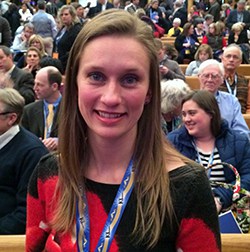 Makers of me. Sarah Quartel’s powerful song helped the boys internalize that they can be makers of their own lives. The lyrics go like this:
Makers of me. Sarah Quartel’s powerful song helped the boys internalize that they can be makers of their own lives. The lyrics go like this:
But as I journey out, I look within
And see the spaces inside of me, yet to be filled
Filled with what I have seen, and what I will be…
I talked to Sarah (pictured) after the debut and she exclaimed, “I was overwhelmed! It was like I was levitating because those boys were singing from the heart and with meaning.” Couple lyrics like that with a coming-of-age genre book, and kids can begin to understand their own roles in their own lives.
Makers of the intangible. Music is powerful in ways that can’t adequately be explained. I’d be hard pressed to think anyone reading this hasn’t been emotionally moved by music at some point in their lives, let alone this week. Lori Pope, mom and piano teacher from Clovis, California, underscored that teachers can reach students through music. She cited Hans Christian Andersen’s, “Where words fail, music speaks.”
While the examples provided draw from students singing at the highest levels, the concepts and learnings apply to all people, whether they can carry a tune or not (the latter is the case for me).
Providing all students with a sense that they can make meaning, make change, make history, and much, much more is a duty of our schools. A powerful performing arts experience can’t be replaced – and can help students know they are makers of something far bigger than themselves.
What steps can you take?
- Administrators and Board members: Fund music and performing arts and ensure powerful performing arts experiences to all.
- Parents: Advocate for the arts and expose your kids to early experiences – whether through lessons, Kindermusik, church, or community.
- Teachers: Most importantly, draw connections for students regarding their ability to take initiative. Further find out about opportunities like this (we were thankful Mrs. Gullick of East Ridge HS and Mrs Teoh-Berbee of Lake MS helped kids in our area audition). Participate in the ACDA process as managers, as did Lynn Seidl and Marcy Russell of Wisconsin.
- Students: Get involved in a variety of activities, including the performing arts!
For more check out:


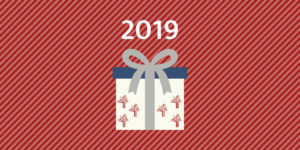
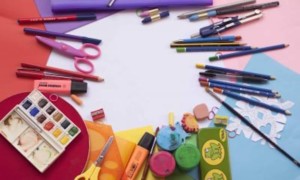
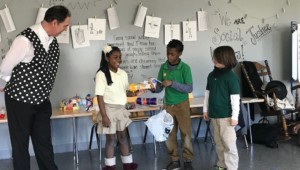
0 Comments
Leave a Comment
Your email address will not be published. All fields are required.